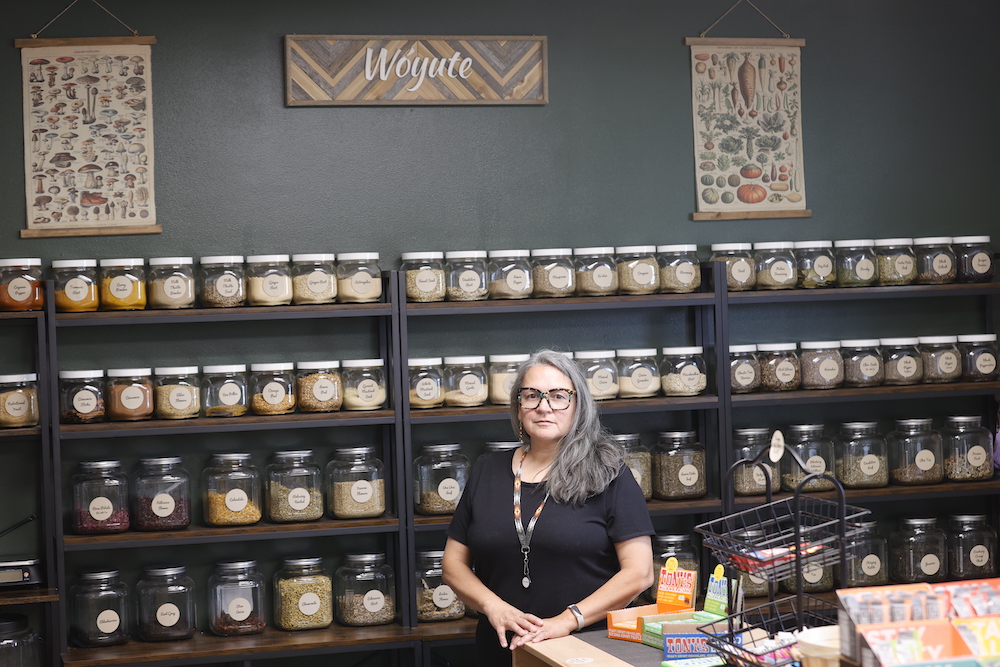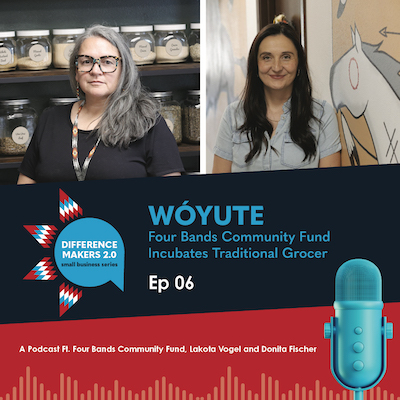
- Details
- By Tribal Business Content Studio
- Sponsored Content
In Eagle Butte, S.D., on the Cheyenne River Lakota Reservation, tribal citizens can find high-quality traditional foods, such as bison and wild rice, at Wóyute Natural Foods & Apothecary.
For owner Donita Fischer (Cheyenne River Lakota), the business she launched in 2023 is a testament to food sovereignty and a commitment to her community.
“Access to healthy foods is really important to me,” Fischer said. “Watching my parents and grandparents succumb to different ailments because of the Western diet introduced to our areas made access to healthy foods a key issue for me.”
Like many Native Americans of their generation who didn't have access to their traditional diets, Fischer's grandparents and mother had diabetes.
“My mom never wanted any of us to get diabetes,” Fischer said. “This is all kind of like a legacy to her.”
Wóyute, which means “groceries” in Lakota, is housed in a business incubator run by Four Bands Community Fund, a certified Native CDFI. Founded in 2000, the CDFI brings access to capital and economic growth to Native Americans living in South Dakota through a four-pronged mission: advocate, educate, finance, and incubate.
Executive Director Lakota Vogel, a member of the Cheyenne River Sioux Tribe, said that while Woyuta isn't a lending client, Four Bands is supporting the business with something more valuable at this stage: the opportunity to test, pivot, and gain a foothold in the community through the commercial space incubator without incurring large financial risk. Four Bands provides small businesses in the incubator with free accounting services, WI-FI, utilities, marketing assistance, and low market rent.
“Markets like the Cheyenne River Sioux reservation have been left behind for decades, if not centuries, for infrastructure development,” Vogel said. “So often, we have really informal economies. For Four Bands, we felt we needed to create physical space for our small businesses to test their ideas with a lower risk.”
Wóyute occupies around 300 square feet, offering bulk and whole foods like fresh produce, seasonings, teas, pantry staples, canned goods, meats, and local dairy.
Getting people to change their grocery habits is challenging, especially when it comes to unfamiliar foods. To introduce the community to the healthy, whole foods Wóyute carries, Fischer hosts cooking demonstrations and launched a hot-food bar serving meals made from goods sold in the store — like protein bowls with wild rice, ground buffalo, Indigenous grains, and corn.
“She is really taking food consciousness and bringing it into conversation with the community,” Vogel said. “It's a product and a service that she is offering.”

“The first thing Donita says is that she wants to help the community,” she said. “It's really helpful to hear from an entrepreneur's perspective because, in our small and rural markets, the first motivation should not be profit.”
Fischer envisions building a cooperative of local suppliers, growers, and subsistence harvesters to source products in the future.
“That is my big, big dream,” Fischer said. “We learned from the pandemic how important it is to have a local economy and local food economy.”
Vogel said Four Bands will be there with Fischer and Wóyute, every step of the way.
“And if she gets to the point where she wants to build a building, and it feels good for her, we will be there,” Vogel said.
Difference Makers 2.0 is a new yearlong series that highlights how Native community development financial institutions (CDFIs) work alongside their small business clients to accelerate change and create economic opportunities in Native communities. Join the Native CDFI Network and Tribal Business News as they shine a spotlight on the people accelerating economic change in Indian Country. Read the stories here and be sure to tune into the Difference Makers 2.0 podcast.
